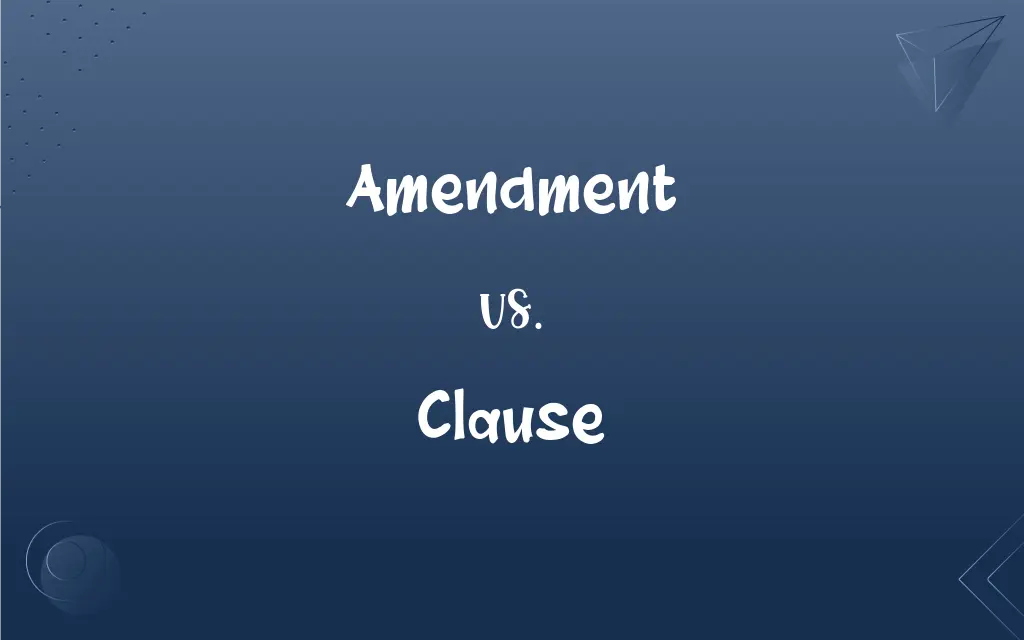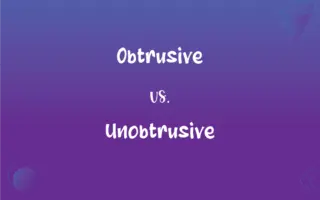Amendment vs. Clause: What's the Difference?
Edited by Harlon Moss || By Janet White || Published on October 21, 2023
An amendment is a formal change or addition proposed or made to a law or document; a clause is a distinct article or provision in a contract, treaty, or constitution.

Key Differences
The terms amendment and clause pertain to the fields of law and governance, having distinct roles and functions. An amendment is a formal alteration or addition made to a document, often a constitution or legislation, to address the evolving needs or correct oversights or errors. It embodies the adaptability and flexibility of legal frameworks, allowing the refinement and updating of laws and policies. Conversely, a clause is a distinct provision, article, or section within a legal document or contract, addressing a specific point or issue and detailing the rights, obligations, or conditions related to it.
Amendments are critical components in the legislative process, providing a mechanism for legal frameworks to stay relevant and responsive to societal changes, developments, and learnings. They are the vehicles for legal evolution and refinement, serving to clarify, modify, or revoke existing provisions or introduce new ones. In contrast, clauses are the building blocks of legal documents, each serving to articulate a specific aspect, condition, or provision of the document, providing clarity and structure to the agreements or statutes they compose.
The concept of an amendment is integral to democratic governance, reflecting the principles of representation and responsiveness. It allows the people, through their representatives, to effect changes to the laws and constitution to better align them with their values, needs, and aspirations. On the other hand, a clause delineates the scope and specifics of legal agreements and statutes, enabling clear and precise communication of the terms and conditions, and providing a basis for interpretation, enforcement, and dispute resolution.
While amendments embody the dynamic nature of legal systems, allowing for modifications and enhancements to address changing circumstances and insights, clauses represent the granularity and precision of legal documentation, specifying the various elements and stipulations that constitute an agreement or law. Both are indispensable in the creation, interpretation, and evolution of legal frameworks, contributing to their coherence, adaptability, and comprehensibility.
The roles of amendments and clauses are thus pivotal in sustaining and advancing legal systems. Amendments ensure that laws and constitutions can be revised and improved to meet emerging challenges and opportunities, while clauses facilitate the detailed and organized expression of legal provisions and commitments, underpinning the effectiveness and reliability of legal agreements and enactments.
ADVERTISEMENT
Comparison Chart
Definition
A formal change or addition to a document or law.
A distinct provision or section in a document.
Purpose
To modify, refine, or add to existing laws or documents.
To articulate specific points or provisions.
Scope
Can be broad, affecting entire sections or documents.
Usually narrow, addressing a single point or issue.
Application
Pertains to legislation and constitutional law.
Found in contracts, treaties, and constitutions.
Effect
Alters or adds to the existing legal framework.
Details the terms, conditions, or provisions of a document.
ADVERTISEMENT
Amendment and Clause Definitions
Amendment
An amendment is a formal modification to a document or legislation.
The 19th Amendment granted women the right to vote.
Clause
It’s a specific section or article in a contract or treaty.
The clause outlined the obligations of both parties.
Amendment
It’s an official change made to a law or constitution.
The First Amendment protects freedom of speech.
Clause
It’s a distinct paragraph detailing a condition in a legal agreement.
The termination clause specified the grounds for contract dissolution.
Amendment
An amendment is an official improvement to a law or constitution.
The amendment sought to clarify the ambiguous language of the statute.
Clause
A clause is a clear provision within a contract addressing specific terms.
The confidentiality clause prohibited the disclosure of proprietary information.
Amendment
An amendment is a legal alteration proposed or enacted by a legislative body.
The amendment to the bill was approved by a majority vote.
Clause
A clause is a distinct provision in a legal document.
The non-compete clause lasted for a year post-employment.
Amendment
The act of changing for the better; improvement
"Society may sometimes show signs of repentance and amendment" (George G. Coulton).
Clause
A clause is a separate provision detailing a point in a document.
The indemnity clause was carefully reviewed by the lawyer.
Amendment
A correction or alteration, as in a manuscript.
Clause
(Grammar) A group of words containing a subject and a predicate and forming part of a compound or complex sentence.
Amendment
The process of formally altering or adding to a document or record.
Clause
A distinct article, stipulation, or provision in a document.
Amendment
A statement of such an alteration or addition.
Clause
(grammar) A verb, its necessary grammatical arguments, and any adjuncts affecting them.
Amendment
Amendment One of the provisions in the US Constitution protecting individual rights.
Clause
(grammar) A verb along with its subject and their modifiers. If a clause provides a complete thought on its own, then it is an independent (superordinate) clause; otherwise, it is (subordinate) dependent.
Amendment
A material, such as organic matter or sand, mixed into soil to improve growing conditions.
Clause
(legal) A separate part of a contract, a will or another legal document.
Amendment
An alteration or change for the better; correction of a fault or of faults; reformation of life by quitting vices.
Clause
To amend (a bill of lading or similar document).
Amendment
In public bodies, any alteration made or proposed to be made in a bill or motion that adds, changes, substitutes, or omits.
Clause
A separate portion of a written paper, paragraph, or sentence; an article, stipulation, or proviso, in a legal document.
The usual attestation clause to a will.
Amendment
(legal) Correction of an error in a writ or process.
Clause
A subordinate portion or a subdivision of a sentence containing a subject and its predicate.
Amendment
An addition to and/or alteration to the Constitution.
The First Amendment guarantees freedom of religion, speech, press, assembly, and petition.
The Thirteenth Amendment to the United States Constitution abolished slavery.
Clause
See Letters clause or Letters close, under Letter.
Amendment
That which is added; that which is used to increase or supplement something.
A soil amendment
Clause
(grammar) an expression including a subject and predicate but not constituting a complete sentence
Amendment
An alteration or change for the better; correction of a fault or of faults; reformation of life by quitting vices.
Clause
A separate section of a legal document (as a statute or contract or will)
Amendment
In public bodies; Any alternation made or proposed to be made in a bill or motion by adding, changing, substituting, or omitting.
Amendment
Correction of an error in a writ or process.
Amendment
The act of amending or correcting
Amendment
A statement that is added to or revises or improves a proposal or document (a bill or constitution etc.)
Amendment
It’s a formal correction or addition to a legal document.
The amendment addressed the oversight in the original contract.
FAQs
Qs every paragraph in a contract a clause?
Aypically, yes—each paragraph or section in a contract that details a specific point or provision is considered a clause.
Qan a clause be an entire page long?
Aes, a clause can be lengthy and detailed, depending on the complexity of the point or provision it is addressing.
Qo all amendments require approval?
Aes, amendments typically require approval through a predetermined process, such as a vote by a legislative body or a referendum.
Qan an amendment be reversed?
Aes, amendments can be reversed or modified by subsequent amendments following the appropriate legal processes.
Qhat is the main difference between an amendment and a clause?
An amendment is a formal change to a law or document, whereas a clause is a distinct provision within a document detailing specific terms or conditions.
Qan an amendment add new provisions to a law?
Aes, an amendment can add new provisions, modify existing ones, or remove outdated ones from a law or document.
Qo all legal documents have clauses?
Aost legal documents, like contracts and treaties, contain clauses to detail specific terms, conditions, and provisions.
Qre amendments to a constitution common?
Amendments to a constitution are not extremely common as they usually require broad consensus and stringent approval processes.
Qan a clause be as short as one sentence?
Absolutely, a clause can be concise, consisting of just one sentence that clearly conveys a specific point or provision.
Qre amendments always beneficial?
Amendments are proposed with the intent to improve or clarify laws, but their perceived benefits can be subjective and debated.
Qo clauses apply to non-legal documents?
Ahile typically associated with legal documents, the term "clause" can refer to any separate section of any document detailing a specific point.
Qs a clause legally binding?
Aes, clauses in a legal document, such as a contract, are generally legally binding on the parties involved.
Qan amendments be proposed by citizens?
Aepending on the jurisdiction, citizens may propose amendments through initiatives, referenda, or other means provided by law.
Qow often are amendments made to laws?
Ahe frequency of amendments varies, depending on the nature of the law and the legislative activity of the jurisdiction.
Qan a document have multiple clauses?
Aes, legal documents often have multiple clauses, each addressing different points or provisions.
About Author
Written by
Janet WhiteJanet White has been an esteemed writer and blogger for Difference Wiki. Holding a Master's degree in Science and Medical Journalism from the prestigious Boston University, she has consistently demonstrated her expertise and passion for her field. When she's not immersed in her work, Janet relishes her time exercising, delving into a good book, and cherishing moments with friends and family.
Edited by
Harlon MossHarlon is a seasoned quality moderator and accomplished content writer for Difference Wiki. An alumnus of the prestigious University of California, he earned his degree in Computer Science. Leveraging his academic background, Harlon brings a meticulous and informed perspective to his work, ensuring content accuracy and excellence.






































































